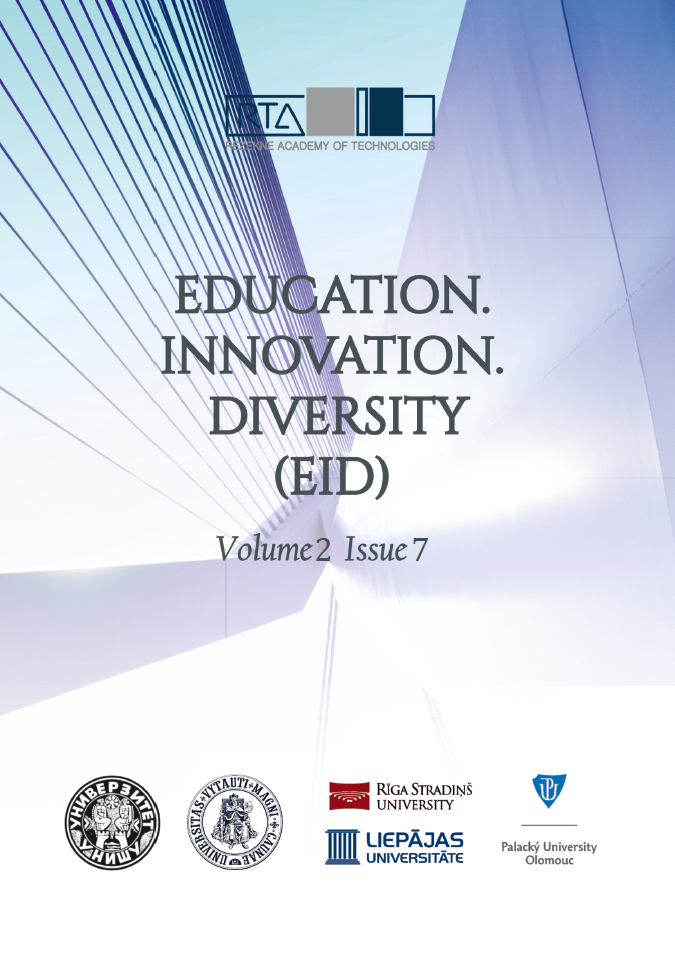ASSESSING THE IMPLEMENTATION OF ONLINE LEARNING IN AN INSTITUTION OF HIGHER LEARNING
DOI:
https://doi.org/10.17770/eid2023.2.7326Keywords:
Online learning, assessment, higher education, transformational practices, research and innovation, teacher educationAbstract
There is a rich body of research done in online teaching and learning in the context of developing countries. However, there is a gap in research on challenges in the implementation of online learning in institutions of higher learning. Lecturers and students' readiness for this shift from classroom-based to online learning is pivotal. The implementation of online learning strategies demands lecturers’ skills on integrating technology with content. This study examines the perceptions of lecturers as they transit from face-to-face to online learning in an institution of higher learning in one developing country. The study is framed theoretically by Suzuki and Keller's Five-E Model for selecting the right model and techniques for appropriate purposes in online design. It used a qualitative research methodology and employed a convenient sampling technique to select three lecturers from each of the three institutions of interest. An open-ended questionnaire was used to collect data and follow up interviews were made. The study used a thematic approach to analyse data. The findings reveal that the lecturers embrace online learning mostly because they are aware that students enjoy learning technology and thus enhance understanding. The challenge raised is the shortage of gadgets which are needed by lecturers to support blended learning. Also, some of the students do not have access to the internet due to socio-economic challenges.
References
Adhola, C., & Okungu, A. A. (2022). Kenya’s Pre-Covid-19 Pandemic Online Education Development and Future Prospects. Journal of Educational Studies, 2022(1), 227-240. Retrieved from https://journals.co.za/doi/abs/10.10520/ejc-jeds_v2022_nsi1_a14
Agbele, A.T., & Ayobele, E. A. (2020). Impact of COVID-19 on the Nigerian educational system: Strengths and challenges of online/virtual education. Asian Journal of Education and Social Sciences, 13(1), 26-35.
Bhebhe, S., & Maphosa, C. (2016). Examining Teachers’ Computer Literacy and Utilization of ICTs in Teaching and Learning at Primary School Level. Journal of Communication, 7(2), 231-240.
Chere-Masopha, J., & Makafane, D. (2021). COVID -19 crisis and teachers’ Micropolitics of online learning in one tertiary education institution in Lesotho. African Perspectives of Research in Teaching & Learning, 5(1), 1-19. Retrieved from http://ulspace.ul.ac.za/bitstream/handle/10386/4011/APORTAL%202021%20SPECIAL%20ISSUE.pdf?sequence=1&isAllowed=y
Creswell, J.W. (2013). Qualitative inquiry and research design: Choosing among 5 traditions. San Francisco, CA: Sage Publications.
Khoza, S. B. (2020). Academics’ “why” of knowledge-building for the fourth industrial revolution and COVID-19 era. International Journal of Higher Education, 9(6), 247–258. Retrieved from https://eric.ed.gov/?id=EJ1278167
Khoza, S. B., & Mpungose, C. B. (2022). Digitalised curriculum to the rescue of a higher education institution. African Identities, 20(4), 310-330. DOI: https://doi.org/10.1080/14725843.2020.1815517
Makafane, D., & Chere- Masopha, J. (2021). COVID-19 Crisis: Challenges of Online Learning in One University in Lesotho. African Perspectives of Research in Teaching & Learning, 5(1), 126-138. Retrieved from http://ulspace.ul.ac.za/bitstream/handle/10386/3299/makafane_covid-19_2021.pdf?sequence=1
Makumane, M. A. (2021). Students’ perceptions on the use of LMS at a Lesotho university amidst the COVID-19 pandemic. African Identities, 1-18.
Marzano, G., & Zając, A. (2022). Emergency remote education and smart working at three European higher education institutions. International Journal of Web-Based Learning and Teaching Technologies (IJWLTT), 17(6), 1-22. DOI: 10.4018/IJWLTT.287553
Matee, G. L., Motlohi, N., & Nkiwane, P. (2023). Emerging perspectives and challenges for virtual collaborative learning in an institution of higher education: a case of Lesotho. Interactive Technology and Smart Education, 20(1), 73-88. DOI: https://doi.org/10.1108/ITSE-06-2021-0110
Mokala, N.T. (2022). Teachers’ narratives of their teaching experiences of learners with hearing impairment in a special school in Gauteng (Doctoral Thesis, University of Johannesburg).
Mpungose, C. B., & Khoza, S. B. (2022). Postgraduate students’ experiences on the use of Moodle and Canvas learning management system. Technology, Knowledge, and Learning, 27(1), 1-16. DOI: https://doi.org/10.1007/s10758-020-09475-1
Naidoo, J. (2022). Online Pedagogy: Implications for Postgraduate Mathematics Teacher Education in the Context of Covid-19. Journal of Educational Studies, 2022(si1), 241-261. Retrieved from https://journals.co.za/doi/abs/10.10520/ejc-jeds_v2022_nsi1_a15
Nxumalo-Dlamini, N. L., & Gaigher, E. (2019). Teachers’ use of computer-based simulations in teaching electrolysis: A case study in Eswatini. African Journal of Research in Mathematics, Science and Technology Education, 23(3), 320-331. Retrieved from https://journals.co.za/doi/abs/10.1080/18117295.2019.1688475
Roopa, A & Satya, R. M. (2012). Questionnaire Designing for a survey. The Journal of Indian Orthodontic Society, 46(4), 37-41. Retrieved from https://journals.sagepub.com/doi/pdf/10.5005/jp-journals-10021-1104
Sefotho, M. M. (2013). Narratives of differently abled persons: informing career guidance Policy (Doctoral Thesis, University of Pretoria).
Sokhulu, L. H. (2021). Students’ experiences of using digital technologies to address their personal research needs during the COVID-19 lockdown. African Identities, 19(4), 436-452. DOI: https://doi.org/10.1080/14725843.2020.1801384
Suzuki, K. & Tada, N. (2009). A Layers of Quality Model in Online Course Design: The Five - E Model. International Journal for Educational Media and Technology, 3(1), 92-103. Retrieved from https://ijemt.org/index.php/journal/article/view/160
Suleiman, Y. (2022). Covid-19 Lockdown and Students’ Perception of Online Examination Initiative in Al-Hikmah University, Nigeria: Implications for Management. Journal of Educational Studies, 21(2), 18-39. Retrieved from https://journals.co.za/doi/abs/10.10520/ejc-jeds_v21_n2_a3
Szadziewska, A., & Kujawski, J. (2017). Advantages and disadvantages of the blended- learning method used in the educational process at the faculty of management at the University of Gdansk, in the opinion of undergraduate students. In ICERI2017 Proceedings (pp. 3938-3946). IATED.
Downloads
Published
Issue
Section
License
Copyright (c) 2023 Education. Innovation. Diversity.

This work is licensed under a Creative Commons Attribution 4.0 International License.






